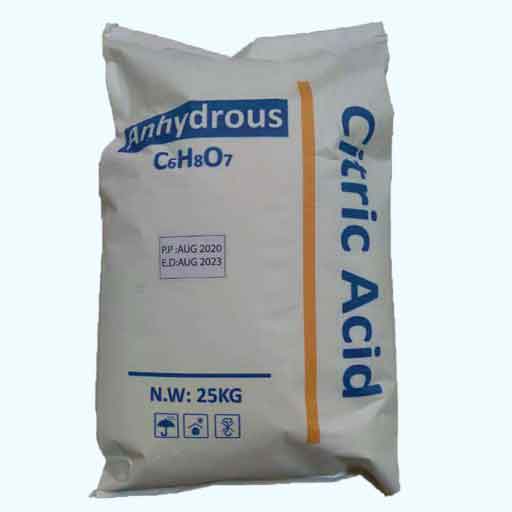Description
- What is citric acid?
- Production and synthesis of citric acid
- Application of citric acid
- The dangers of citric acid
- Price inquiry and purchase of citric acid
What is citric acid?
Citric acid is one of the weak organic acids with the chemical formula HOC(CO2H)(CH2CO2H)2. In its natural state, it is similar to small, clear crystals of table salt. Although it is odorless, it has an acidic taste and is naturally present in citrus fruits.
There are natural and synthetic sources of citric acid.
- Natural resources
- According to research, citrus fruits such as lemons and limes have the highest amount of natural citric acid.
- Other natural sources include tangerines, oranges, grapefruits, pineapples, tomatoes, broccoli, carrots, and berries.
- Artificial resources
- Scientists have developed a synthetic form of citric acid using the fungus Aspergillus niger, known as manufactured citric acid (MCA). While MCA has the same chemical formula as natural citric acid, it can contain black mold residues and cause allergies or unwanted effects when consumed.
Production and synthesis of citric acid
In 1917, American food chemist James Currie discovered that certain strains of Aspergillus niger could produce citric acid, and the pharmaceutical company Pfizer began industrial-scale production using this method two years later. The method that today is still the main industrial way to get citric acid.
Application of citric acid
Cosmetics and personal care products:
- As an ingredient in personal care products, citric acid can help brighten skin, correct dark spots, and minimize fine lines.
- Products containing citric acid can be formulated for use near the eyes, lips, mouth, and nasal passages, as well as for safe use on baby skin.
- Citric acid and its salts may be used in hair sprays, deodorants and body sprays.
- Sodium citrate, citric acid salt, is used in lipstick, soap and detergents and helps to adjust their pH level.
- Antioxidants:
- Antioxidants, derived from citric acid, can help preserve food for a longer period of time. For example, sprinkling lemon juice, which contains citric acid, on apples or bananas can help prevent them from turning brown.
- Ascorbic acid, better known as vitamin C, is also found in citric acid and is often used to help protect and preserve beverages and meats.
- Cleaning products:
- Citric acid may be added to commercial cleaning products, as it can help remove hard water build-up on dishes.
- It can also be used to remove coffee and tea stains, yellow/brown discolorations, and water and urine stains.
Dangers of citric acid
Citric acid in both natural and synthetic forms can damage tooth enamel. For this reason, after eating or drinking products containing high citric acid, a person should rinse his mouth to protect his teeth.
People who use citric acid in their skin care should also be careful, as using high concentrations on the skin may cause irritation. Citric acid can increase the skin’s sensitivity to UVB rays and make a person vulnerable to skin damage.
Price inquiry and purchase of citric acid
Due to the wide and diverse use of citric acid, Oxin Chemistry has made it possible for respected buyers to purchase this useful material to provide the materials needed by their industries at a reasonable cost. To inquire about the price and buy citric acid, please contact our colleagues.


Reviews
There are no reviews yet.